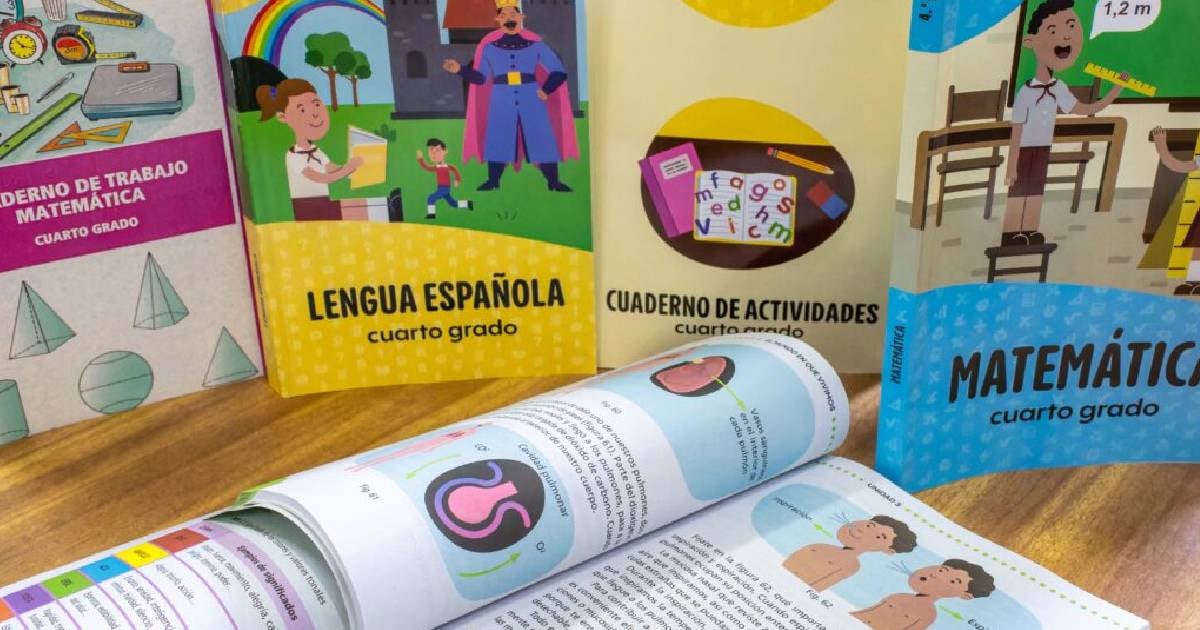The Observatory of Academic Freedom (OLA) has expressed serious concern over the new textbooks that the Cuban regime has distributed to students this school year, noting a marked increase in indoctrination. In a statement, OLA addressed the Third Improvement of Education in Cuba, during which a total of 506 textbooks and workbooks were redesigned collaboratively by the Ministry of Education (MINED), the Pueblo y Educación publishing house, and the Higher Institute of Design (ISDi).
According to the Observatory, the new materials were initially provided to first and fourth graders last school year and are scheduled to be distributed to second and fifth graders this year. An official report from the state-run TV Yumurí indicated that, in addition to the mentioned grades, the textbooks were also given to students in seventh grade of basic secondary education, tenth grade in pre-university, the first year of Technical and Professional Education, Teacher Training, as well as to those in youth and adult education.
OLA's denunciation highlights that the most concerning aspect of these new textbooks is not their design but the "strong doctrinal content within their pages." The statement pointed out, "Convinced of the ever-diminishing reach of their ideological framework, the Cuban state continues to rely on school-based manipulation from the early stages of intellectual development."
The new content prominently features figures like Cuban ruler Miguel Díaz-Canel, alongside the glorification of Che Guevara, Fidel Castro, and Celia Sánchez. "If one carefully flips through the reading book given to first graders, there's a noticeable increase in images associated with the 'Revolution.' To teach young children the proper use of letters, every 'historical milestone of Fidelism' was utilized," they detailed.
Previously, the educational process focused on extolling social figures related to the period following Fidel Castro's rise to power. It was common to find texts referencing sugar cane planting and harvesting, highlighting the figure of the militiaman, the worker as a pillar of the new society, and, of course, the rebels' earlier struggles.
Concern Over Ideological Control in Education
The scope of these changes and the concern over their implementation prompted OLA to urge UNESCO and the Latin American Laboratory for Assessment of the Quality of Education to conduct a thorough review of the new educational materials distributed, aiming to correct their intent of ideological control over new generations of Cubans.
Additionally, the quality of the bookmaking process raises issues, as these books will be passed from hand to hand. "Among the measures taken for their conservation is pagination to ensure control, and it has been indicated that they can be covered but without using clips or adhesive tape on the covers," explained Yainet Trejo Moreno, Deputy Director of Education in Matanzas.
These new textbooks have caught the attention of parents, who are concerned about their content and the dangers of the ideals they transmit. The indoctrination of young students is a systematic practice in Cuban education and has various expressions in the regime's imaginary. In February of this year, a video surfaced showing a teacher, a member of the Communist Party, visiting a fifth-grade classroom to speak to children about the "honor" of being a party member, generating widespread criticism.
The school year in Cuba is filled with moments where students are mobilized for propagandistic events aimed at shaping their "revolutionary consciousness," from May Day parades to laying flowers for Camilo Cienfuegos.
Frequently Asked Questions About Cuban Textbook Indoctrination
Given the concerns raised by the Observatory of Academic Freedom regarding the Cuban regime's new textbooks, we've compiled a list of frequently asked questions to provide further insights into this issue.
What is the Third Improvement of Education in Cuba?
The Third Improvement of Education in Cuba is a recent initiative by the Ministry of Education, involving the redesign of 506 textbooks and workbooks for various grade levels, aimed at intensifying ideological content.
Why is the Observatory of Academic Freedom concerned about these new textbooks?
The Observatory of Academic Freedom is concerned because the new textbooks contain a strong doctrinal content aimed at indoctrinating students from an early age, promoting figures like Miguel Díaz-Canel and glorifying revolutionary icons like Che Guevara and Fidel Castro.
